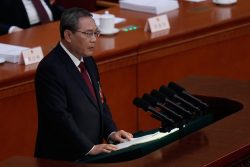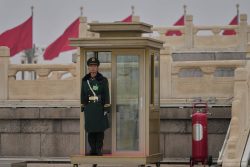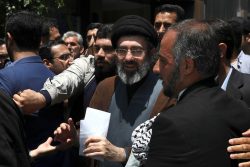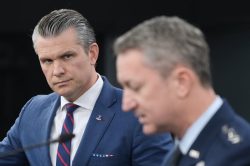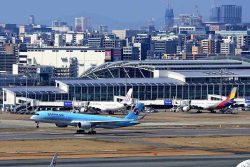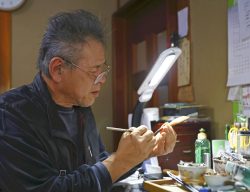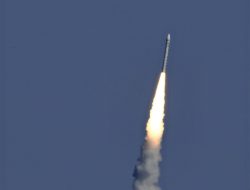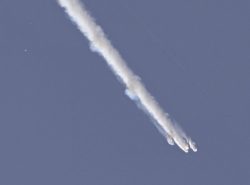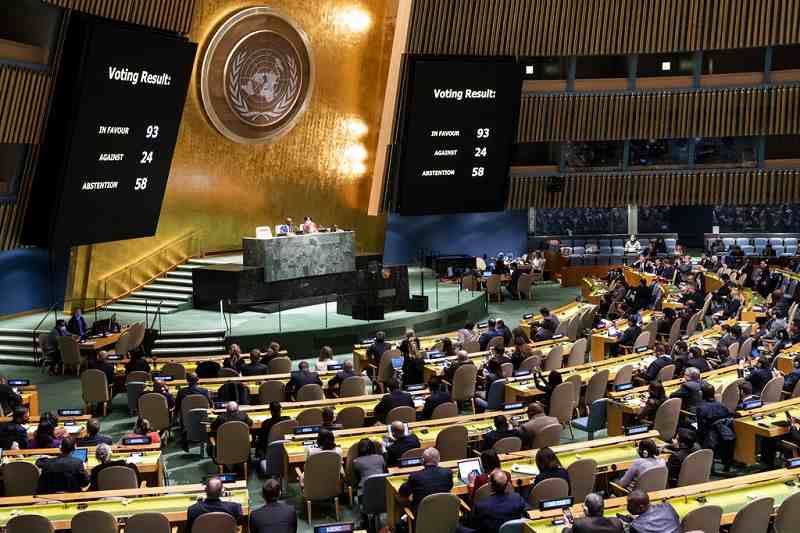
A completed resolution vote tally to affirm the suspension of the Russian Federation from the United Nations Human Rights Council is displayed during a meeting of the United Nations General Assembly on Thursday at United Nations headquarters.
12:47 JST, April 8, 2022
UNITED NATIONS (AP) — The U.N. General Assembly voted Thursday to suspend Russia from the world organization’s leading human rights body over allegations that Russian soldiers in Ukraine engaged in rights violations that the United States and Ukraine have called war crimes.
It was a rare, if not unprecedented rebuke against one of the five veto-wielding members of the U.N. Security Council.
U.S. Ambassador Linda Thomas-Greenfield called the vote “a historic moment,” telling the assembly: “We have collectively sent a strong message that the suffering of victims and survivors will not be ignored” and that Russia must be held accountable “for this unprovoked, unjust, unconscionable war.”
Thomas-Greenfield launched the campaign to suspend Russia from the U.N. Human Rights Council in the wake of videos and photos showing streets in the town of Bucha on the outskirts of the capital, Kyiv, strewn with the bodies of civilians after Russian soldiers retreated. The deaths have sparked global revulsion and calls for tougher sanctions on Russia, which has vehemently denied its troops were responsible.
U.S. President Joe Biden said the vote demonstrated how Russian President Vladimir Putin’s war “has made Russia an international pariah.” He pledged to continue working with other nations to gather evidence to hold Russia accountable, increase the pressure on its economy and isolate it on the international stage.
Russia is only the second country to have its membership rights stripped at the rights council. The other, Libya, was suspended in 2011 by the assembly when upheaval in the North African country brought down longtime leader Moammar Gadhafi.
The Geneva-based Human Rights Council is tasked with spotlighting and approving investigations of rights violations, and it does periodic reviews of the human rights situation in all 193 U.N. member nations.
It has created commissions of inquiry — which provide its highest level of scrutiny on alleged rights violations and abuses — for conflicts in Ukraine, Syria, the Palestinian territories and elsewhere. It has also set up fact-finding missions in places like Libya, Myanmar and Venezuela.
The vote on the U.S.-initiated resolution suspending Russia was 93-24 with 58 abstentions, significantly lower than on two resolutions the assembly adopted last month demanding an immediate cease-fire in Ukraine, withdrawal of all Russian troops and protection for civilians. Both of those resolutions were approved by at least 140 nations.
Russia’s deputy ambassador, Gennady Kuzmin, said after the vote that Russia had already withdrawn from the council before the assembly took action, apparently in expectation of the result. By withdrawing, council spokesman Rolando Gomez said Russia avoided being deprived of observer status at the rights body.
Kuzmin said Russia considers adoption of the resolution “an illegitimate and politically motivated step” by a group of countries with “short-term political and economic interests” that he accused of “blatant and massive violations of human rights.”
The 47-member Human Right Council was created in 2006 to replace a commission discredited because of some members’ poor rights records. The new council soon faced similar criticism, including that rights abusers sought seats to protect themselves and their allies, and for focusing on Israel.
Along with Russia, four other permanent members of the U.N. Security Council — Britain, China, France and the United States, which rejoined this year — currently are serving three-year terms on the Human Rights Council. Other members with widely questioned rights records include China, Eritrea, Venezuela, Sudan, Cuba and Libya.
While almost half the U.N.’s 193 member nations supported the resolution, more than half either voted against it, abstained or didn’t vote.
Explaining their decision not to support the resolution, some countries called it premature, noting there are ongoing investigations into whether war crimes have occurred, or said it would undermine the credibility of the Human Rights Council and the United Nations. Others said the resolution reflected American and European geopolitical agendas and what opponents called Western hypocrisy and selective outrage about human rights.
In addition to a Human Rights Council investigation being led by former Norwegian judge Erik Mose, who previously served as president of the International Criminal Tribunal for Rwanda, the International Criminal Court is conducting an investigation of possible war crimes in Ukraine.
Before the vote, Ukraine’s U.N. Ambassador Sergiy Kyslytsya urged assembly members to keep the Human Rights Council from “sinking” and suspend Russia, saying it has committed “horrific human rights violations and abuses that would be equated to war crimes and crimes against humanity.”
“Russia’s actions are beyond the pale,” he said. “Russia is not only committing human rights violations, it is shaking the underpinnings of international peace and security.”
In a document circulated by Russia and obtained by The Associated Press, Russia said the U.S. and other opponents want to preserve their control over the world and continue “the politics of neo-colonialism of human rights” in international relations.
Kyslytsya responded to Russia’s complaints saying: “We have heard, many times, the same perverted logic of the aggressor trying to present itself as the victim.”
The General Assembly voted 140-5 with 38 abstentions on March 24 on a resolution blaming Russia for the humanitarian crisis in Ukraine and urging an immediate cease-fire and protection for millions of civilians and the homes, schools and hospitals critical to their survival.
The vote was almost exactly the same as for a March 2 resolution that the assembly adopted demanding an immediate Russian cease-fire, withdrawal of all its forces and protection for all civilians. That vote was 141-5 with 35 abstentions.
Both of those votes were not legally binding but did have clout as a reflection of global opinion.
Thursday’s vote and Russia’s withdrawal, however, have a direct impact on Moscow’s voice in a human rights body that has increasingly become a venue for a global stand-off between Western democracies and autocratic countries. China will lose a key ally there.
China abstained in both assembly votes last month but voted against suspending Russia from the Human Rights Council.
Top Articles in News Services
-

Survey Shows False Election Info Perceived as True
-

Hong Kong Ex-Publisher Jimmy Lai’s Sentence Raises International Outcry as China Defends It
-

Japan’s Nikkei Stock Average Falls as US-Iran Tensions Unsettle Investors (UPDATE 1)
-

Japan’s Nikkei Stock Average Touches 58,000 as Yen, Jgbs Rally on Election Fallout (UPDATE 1)
-

Japan’s Nikkei Stock Average Rises on Tech Rally and Takaichi’s Spending Hopes (UPDATE 1)
JN ACCESS RANKING
-

Producer Behind Pop Group XG Arrested for Cocaine Possession
-

Japan PM Takaichi’s Cabinet Resigns en Masse
-

Man Infected with Measles Reportedly Dined at Restaurant in Tokyo Station
-

Israeli Ambassador to Japan Speaks about Japan’s Role in the Reconstruction of Gaza
-

Videos Plagiarized, Reposted with False Subtitles Claiming ‘Ryukyu Belongs to China’; Anti-China False Information Also Posted in Japan


